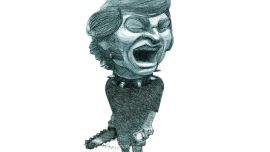What is Reas?
Reas is a film starring people who have been deprived of their liberty. They are people who were in women's prisons, basically women and trans people, who reconstruct their life stories in a musical documentary where the stories of several protagonists are told at the same time.
It's a long-standing project?
Yes, the film is a project which began in 2009 with some film, theatre and choreography workshops I did in prison, where we started to try out scenes and acting inside the prison and also to do dance and music training. In fact, I went to prison with a small film crew and with Leticia Mazur, who was the choreographer who accompanied me. And we did scenes, we sang, they reconstructed part of their lives, we did karaoke and there was also physical and dance training.
During those workshops I realised that doing that work gave them enormous freedom in their context of confinement. The freedom of imagination, of fantasy, of acting... of being able to do other things with their bodies. The bodies inside the prison are watched, controlled, punished all the time. And to be able to dance, sing and play characters was to open up a new and different space, within that space of torture and overcrowding that is prison.
What was your first idea?
Originally, my idea was to make the whole film inside Ezeiza prison. Then, with the pandemic, that became impossible because you couldn't go back in. For a while, I thought we weren't going to be able to make the film. But we kept trying to get funds to make it and finally we decided to change the original concept a bit and make the film in an ex-prison, in this case the one in Caseros where we are shooting now, with people who were once deprived of their freedom, but are no longer there. We started with the search for these people, with rehearsals, and then we started filming. It is an Argentine, German and Swiss co-production, and has the support of very important funds, such as Sundance, among others.
Why did you choose the musical genre?
The musical genre allows me to move away from prison realism and propose another point of view and another way of approaching the representation of prison. I'm not interested in making a film which reproduces stigmatisation, violence or everything associated with people who have been deprived of their freedom. I wanted the film to propose a new world in the sense of seeing these people as people who lived through that horrible and radical experience, but who have a lot of things to give in relation to what they lived inside and outside.
They are people you met and you want to make known beyond the stereotypes?
They are incredible, brilliant, beautiful people, who also have the right to think about a possible future, without being marked exclusively by that experience. I think that what I also highlight in the film is the solidarity and what some people can do for others in such a brutal context.





















Comments